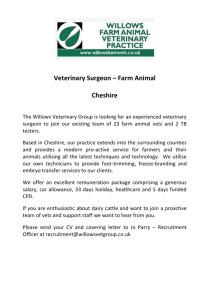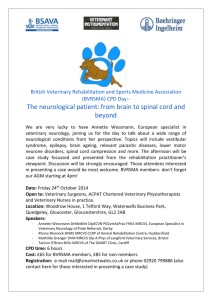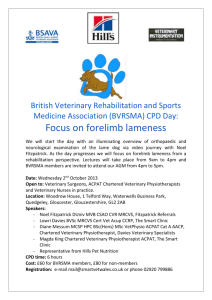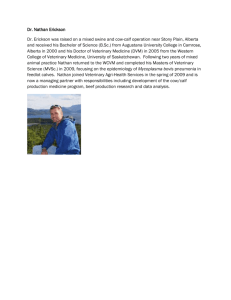Learning and Teaching Plan
advertisement
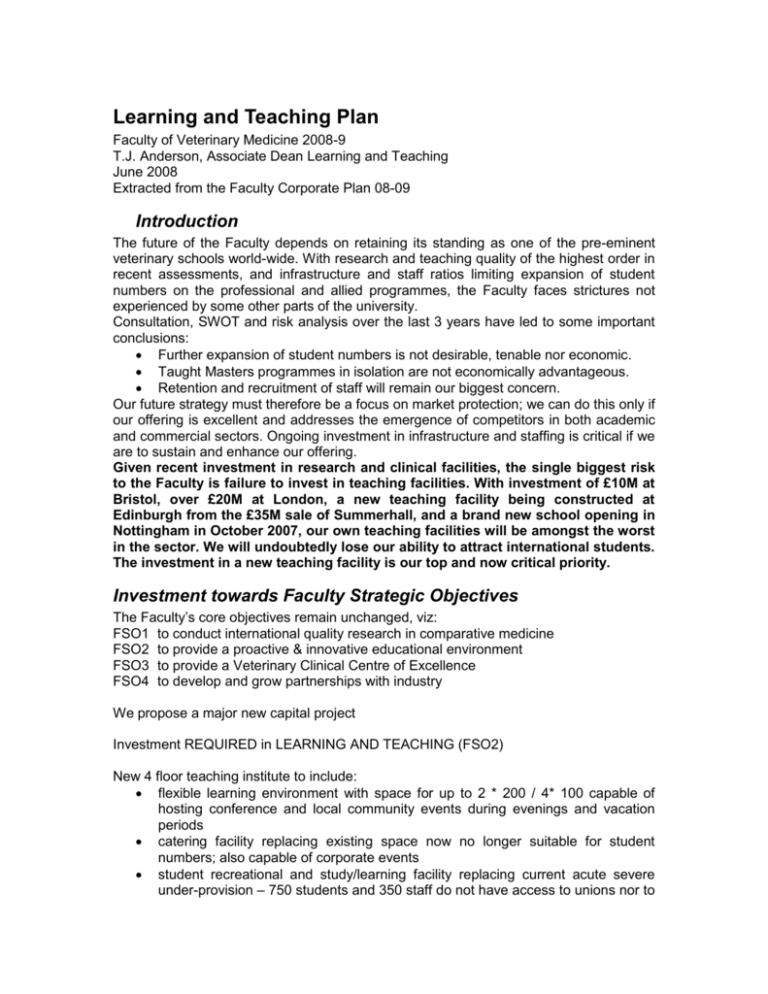
Learning and Teaching Plan Faculty of Veterinary Medicine 2008-9 T.J. Anderson, Associate Dean Learning and Teaching June 2008 Extracted from the Faculty Corporate Plan 08-09 Introduction The future of the Faculty depends on retaining its standing as one of the pre-eminent veterinary schools world-wide. With research and teaching quality of the highest order in recent assessments, and infrastructure and staff ratios limiting expansion of student numbers on the professional and allied programmes, the Faculty faces strictures not experienced by some other parts of the university. Consultation, SWOT and risk analysis over the last 3 years have led to some important conclusions: Further expansion of student numbers is not desirable, tenable nor economic. Taught Masters programmes in isolation are not economically advantageous. Retention and recruitment of staff will remain our biggest concern. Our future strategy must therefore be a focus on market protection; we can do this only if our offering is excellent and addresses the emergence of competitors in both academic and commercial sectors. Ongoing investment in infrastructure and staffing is critical if we are to sustain and enhance our offering. Given recent investment in research and clinical facilities, the single biggest risk to the Faculty is failure to invest in teaching facilities. With investment of £10M at Bristol, over £20M at London, a new teaching facility being constructed at Edinburgh from the £35M sale of Summerhall, and a brand new school opening in Nottingham in October 2007, our own teaching facilities will be amongst the worst in the sector. We will undoubtedly lose our ability to attract international students. The investment in a new teaching facility is our top and now critical priority. Investment towards Faculty Strategic Objectives The Faculty’s core objectives remain unchanged, viz: FSO1 to conduct international quality research in comparative medicine FSO2 to provide a proactive & innovative educational environment FSO3 to provide a Veterinary Clinical Centre of Excellence FSO4 to develop and grow partnerships with industry We propose a major new capital project Investment REQUIRED in LEARNING AND TEACHING (FSO2) New 4 floor teaching institute to include: flexible learning environment with space for up to 2 * 200 / 4* 100 capable of hosting conference and local community events during evenings and vacation periods catering facility replacing existing space now no longer suitable for student numbers; also capable of corporate events student recreational and study/learning facility replacing current acute severe under-provision – 750 students and 350 staff do not have access to unions nor to Gilmorehill campus and our library space is now inadequate – we have doubled student numbers with no increase in provision. a James Herriot Centre (open to the public) encompassing the scope and history of the veterinary profession an administration floor and new front door to the Faculty, freeing existing McCall Building for office space likely investment £7M income from teaching, conference and functions Comment on Key Performance Indicators Learning and Teaching Undergraduate student numbers will rise with the introduction of the new MSci/BSc(Hons)/BSc in Veterinary Biosciences degree. However, this will be offset by an expected reduction in UK/EU 2nd degree students to the BVMS programme. Four new additional research and teaching positions have been approved to support the new programme and the BVMS more generally. It was proposed that one appointment would be made next year (08-09), two the following year, and the final appointment the year after that. The Dean emphasised, however, that Heads of Divisions and Course Leaders would be required to ensure that additional teaching was not given to those individuals who already carried an onerous teaching load. Entry to the BVMS programme remains highly competitive; as a result entry standards and year 1-2 progression rate KPIs are strong and are likely to remain so for the foreseeable future. Although there has been an overall increase in UK veterinary graduates in recent years, employment prospects remain very good. Generally the NSS reflects well on the Faculty but has highlighted some areas for improvement. Results suggest that students would appreciate more formalised feedback on their performance, especially during final year rotations. Plans are in place to address the main issues raised by the NSS. Together with most of the UK Veterinary Schools, the Faculty is supporting the Gateway Scheme, an initiative designed to overcome the problems of poor application numbers from low participation areas. In addition, we intend to work more closely with the Medical Faculty in effectively tackling this issue. However, the Faculty is of the view that a target of 16% is unrealistic unless a more radical approach to admissions is adopted. It is expected that the PG headcount will show a modest rise over the next five years due to enhanced uptake of the Masters in Veterinary Public Health and increased provision in this area. Learning and Teaching SWOT STRENGTHS STUDENTS BVMS recruitment successful Student income may be greater than expected BVetSci course starts 2008. Widening participation students. Some support within the University for recruiting students TAUGHT MASTER DEGREES/CPD Diverse skill set in Faculty with potential for range of courses and styles of delivery. INFRASTRUCTURE Substantial ongoing infrastructural investment recently completed and in progress improving quality of teaching environment Cochno a substantial infrastructural resource related to activity that is encouraged by government OPPORTUNITIES STUDENTS To invest extra income if higher income confirmed Increased student income within current infrastructure To increase opportunity for cohorts of society that is highly valued by government Improve attractiveness of the Garscube estate and flexibility of infrastructure by improving and widening access to student social facilities TAUGHT MASTER DEGREES/CPD Potential for niche marketing of skills of high value INFRASTRUCTURE Cochno - to locate and develop more of the relevant areas of teaching at this facility McCall building. With the relocation of the SAH there is the opportunity to expand clinical skills and small group teaching spaces WEAKNESSES STUDENTS Faculty now around maximum numbers in BVMS. UK centric content of the course does not make us the preferred provider for some African (and other non-European/N. American countries) Faculty (and University) have difficulties in modelling student population, which affects planning process Finance of BVetSci not confirmed Lack of Faculty experience/infrastructure in supporting students with specific social and studying needs Student social space limited to undergraduate use and of limited quality/utility TAUGHT MASTER DEGREES/CPD Access to market research is poor. Modelling of MVPH difficult to understand - planning & assessment of financial viability difficult INFRASTRUCTURE Cochno substantial costs for immediate upgrading and medium term development for activities of interest to minority of undergraduates Teaching facilities now increasingly dated THREATS STUDENTS Competition for O/S students to increase substantially from both Edinburgh and London; medium term expansion in USA schools Planning uncertainties with missed or inappropriate investments due to poor understanding of major income stream Increased teaching costs and implications of course management and resource requirements. Different motivational background may affect progress and completion rates Tariff, progression and retention issues Increasing student numbers (B. Vet Bioscience) put increasing strain on space and fabric and pressure of social space TAUGHT MASTER DEGREES/CPD Markets uncertain and potential for poor utilisation of staff and other resources in creating nonviable courses. INFRASTRUCTURE Large areas of poor infrastructure may have negative effect on recruitment of staff and students, prevent courses running Cochno – may be deemed unaffordable


